


















rains from Hurricane
record flooding
mph and storm surges that killed more than 100
North Carolina in crisis, Trump lies Western North Carolina is enduring full-blown catastrophe. In the wake of Hurricane Helene, towns have been destroyed, roads have been washed out, people are frantically trying to locate loved ones, and dozens have died. Enter Donald Trump, who just declared that the federal government—and Democratic Governor Roy Cooper—are deliberately neglecting MAGA parts of the state, and charged that the Biden administration is consciously letting Americans drown. It’s just another lie in a long stream of lies. When The Washington Post Fact Checker team first started cataloguing President Donald Trump’s false or misleading claims, they recorded 492 suspect claims in the first 100 days of his presidency. On Nov. 2 alone, the day before the 2020 vote, Trump made 503 false or misleading claims as he barnstormed across the country in a desperate effort to win reelection. This astonishing jump in falsehoods is the story of Trump’s tumultuous reign. By the end of his term, Trump had accumulated 30,573 untruths during his presidency — averaging about 21 erroneous claims a day.

we’d much rather you expand train service, light rail, high speed light rail…something, anything, other than one more lane to be backed up in!
What is especially striking is how the tsunami of untruths kept rising the longer he served as president and became increasingly unmoored from the truth. But hey, his base doesn’t care so the lies will continue.
It’s official. Starting in 2025, Houston’s highways will undergo another widening project to the tune of $11 billion, impacting 450 acres and displacing 344 businesses and 1,079 homes. I get it. We need another lane, but if I may…. we, the driving delegation of the Bayou City, would like to let it be known that we are tired of driving everywhere. We’re tired of sitting in traffic, dealing with road rage, and
Houston lawyer Tony Buzbee has announced that his firm has been retained by at least 120 individuals “to pursue cases in civil court” against rapper and record executive Sean “Diddy” Combs. In a statement, Buzbee said, “The violations against this group of individuals are mindboggling and can only be described as debauchery and depravity, exacted by powerful people against minors and the weak.” Buzbee said he expects many other individuals will be implicated. Earlier this week, a Harris County woman also filed a lawsuit against Combs claiming that he sexually assaulted and raped her in 2001 in New York. Last week, Houston resident Thalia Graves claimed that Combs and his then-bodyguard Joseph “Big Joe” Sherman possibly drugged and assaulted her. At the time, Graves was living in New York with her then-boyfriend who was allegedly an executive at Combs’ studio, according to the lawsuit. She said the lawsuit and alleged assault has interfered with her everyday life, causing post-traumatic stress disorder (PTSD), and depression. Combs is jailed and has been denied bail twice while he awaits trial on racketeering charges. The bad boy is definitely living up to his moniker.
• Houston’s Haitian advocates are fed up with Trump’s remarks.
• Defender Roundable: What has Donald Trump done for Black people.
• High School Sports: Tory Blaylock’s explosive play fuels Atascocita Eagles’ unbeaten run.
By Amaka Watson
The once beloved staple of Houston’s Third Ward, Turkey Leg Hut, now faces many challenges threatening its future. The Houston Health Department recently ordered the restaurant’s shutdown due to nearly three dozen health violations, putting the business at a critical crossroads. This latest setback adds to years of legal, financial, and operational woes, raising a pressing question: Is the Turkey Leg Hut closed for good?
Turkey Leg Hut’s journey began nearly a decade ago as a modest food stand across from the Houston Livestock Show and Rodeo. Known for its signature turkey legs stuffed with Cajun flavors, the restaurant quickly became a hit, drawing long lines of supporters. Its location in Houston’s historically Black Third Ward became a cultural hub, attracting celebrities, tourists, and local residents.
However, with success came scrutiny, and the Turkey Leg Hut has faced a series of issues that seem to have culminated in its current predicament.
In July 2021, Turkey Leg Hut faced controversy after implementing a strict dress code, which some viewed as discriminatory against its core clientele. Despite owners Nakia Price and Lynndell Price defending the policy as necessary for a family-friendly atmosphere, it sparked backlash online and in the media.
The problems, however, didn’t stop at
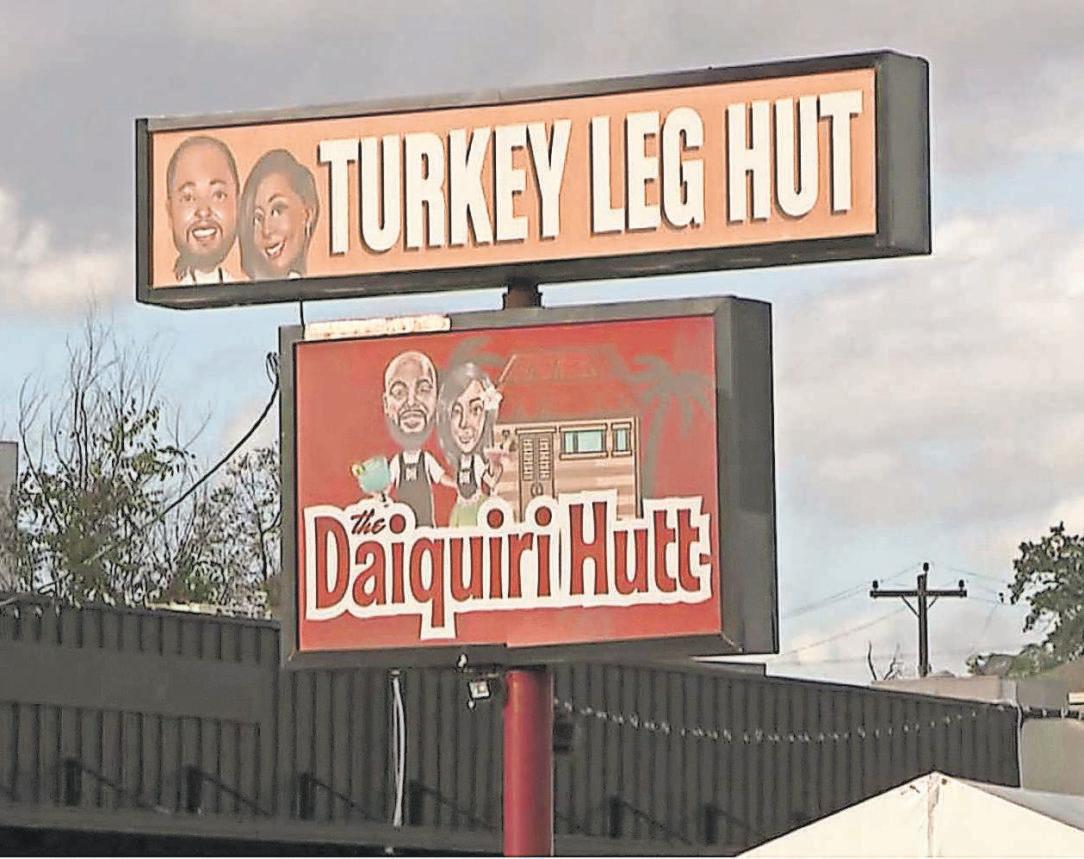
dress codes. In December 2022, the restaurant faced a lawsuit from US Foods, a major foodservice distributor, which claimed the Turkey Leg Hut owed over $1.2 million in unpaid bills. This lawsuit began a troubling trend of financial issues for the restaurant.
In January 2023, Turkey Leg Hut faced financial difficulties, leading to Steve Rogers, a former investor and partner, filing
a lawsuit for over $1 million in monetary relief. Rogers had previously agreed to a redemption package worth $1.5 million, but the restaurant defaulted, resulting in a court ruling awarding him over $900,000, further straining the business.
Around the same time, Turkey Leg Hut’s co-founder Lynn Price and more than half of the business’s employees were
reportedly fired. The business appeared to be in turmoil, with questions arising about the stability of its operations and the leadership of the remaining co-owner, Nakia Holmes.
In March 2023, Turkey Leg Hut’s business office in Third Ward caught fire, causing extensive damage. The restaurant filed for Chapter 11 bankruptcy within three weeks, citing significant debt and ongoing creditor claims. This allowed the restaurant to reorganize its finances and continue operating.
However, recent developments show that the situation has only worsened. On Sept. 23, a Chapter 7 bankruptcy motion was filed, which is typically a more drastic measure. Unlike Chapter 11, which focuses on restructuring and continuing operations, Chapter 7 involves liquidating assets to pay creditors, often leading to the closure of the business.
The Houston Health Department recently shut down the Turkey Leg Hut due to nearly three dozen health violations, representing another blow to the restaurant’s reputation. The closure came as the business struggled to regain footing amid financial turmoil and public scrutiny.
Can the Turkey Leg Hut survive this legal, financial, and health-related storm? Only time will tell. The business has withstood many storms, and it could bounce back.
Dockworkers at 36 ports along the eastern U.S., including Houston, have begun their first strike in decades, demanding fair wages and protections against automation. The strike threatens to disrupt supply chains, potentially leading to shortages and price hikes if the work stoppage extends beyond a few weeks. The International Longshoremen’s Association (ILA), representing around 45,000 workers, had its contract expire at midnight, with no new agreement in place despite some progress in negotiations.
At Port Houston, at least 50 workers formed picket lines, holding signs demanding a fair contract. The strike comes at a critical time, just weeks before a tight presidential election, and supply chain disruptions could become a factor if shortages affect voters.
Negotiations between the ILA and the U.S. Maritime Alliance, representing the
ports, saw both sides adjust their wage offers. The union’s initial proposal included a 77% wage increase over six years to address inflation and small raises in past contracts. While ILA members earn a base salary of about $81,000 per year, some can make over $200,000 annually with overtime. In response, the alliance increased its offer to a 50% raise over six years, along with improvements to retirement plans and health care options. However, the union is also pushing for a total ban on automation, and the two sides remain far apart on this issue.
The ILA rejected the latest offer, saying it “fell far short” of what its members demand. Formal negotiations have been stalled since June. Although supply chain experts say consumers won’t see immediate effects since retailers had stocked up ahead of the holiday season, prolonged strikes could lead to delays and increased prices for goods reaching homes and businesses.

By Amaka Watson
In the latest annual U.S. News & World Report ranking, five Texas universities secured positions in the top 100 national universities, reflecting a competitive landscape amid changing metrics and methodologies in higher education rankings.
Rice University is leading the pack. Once again, it holds the title of the highest-ranked university in Texas, coming in at No. 18. While Rice experienced a slight drop from its previous position at No. 17, it maintains a strong reputation for academic excellence.
The University of Texas at Austin made notable progress this year, moving up two spots to No. 30. Meanwhile, Texas A&M University fell to No. 51, down from No. 47 last year. Baylor University and Southern Methodist University tied at No. 91, with Baylor moving up slightly from No. 93 and SMU dropping from No. 89.
However, the overall picture for Texas universities indicates a broader trend of slightly declining standings, particularly among public institutions. With Texas being home to the second-largest

population of post-secondary students in the nation—90% of whom attend public schools—this ranking has sparked discussions about the representation of public universities in the top tiers.
UT-Austin and Texas A&M remain the only Texas schools within the top 50. Other notable public institutions include the University of Texas at Dallas and the
University of Houston, which ranked at No. 144 this year after a significant rise last year. The drop was attributed to changes in U.S. News’ ranking criteria, which removed metrics related to the success of first-generation students.
Despite the setback, University of Houston officials remain optimistic about future improvements. The university is
just five points shy of breaking into the top 50 and aims to increase its six-year graduation rate from 65% to 70% to further enhance its standing. Notably, the University of Houston ranked No. 36 in the nation for social mobility, indicating its commitment to supporting low-income students.
In the Houston area, other institutions also made their mark on the rankings:
University of Houston: No. 144
University of St. Thomas: No. 209
Sam Houston State University: No. 231
University of Houston Clear Lake : No. 315
Prairie View A&M University: No. 359 Texas Southern University : Ranked between No. 392-434
The U.S. News rankings assess nearly 1,500 four-year bachelor’s degree-granting institutions using 17 metrics, emphasizing peer assessments and graduation rates significantly. The adjustments in scoring criteria over the past year have prompted institutions to reevaluate their approaches to improving student outcomes and overall institutional value.
The fight to lower prescription drug prices is hitting Blacks especially hard. A recent report by Patients for Affordable Drugs reveals that pharmaceutical companies have increased prices on more than 1,000 prescription drugs this year, nearly half of those price hikes exceeding the inflation rate. For many Black and Latino patients,
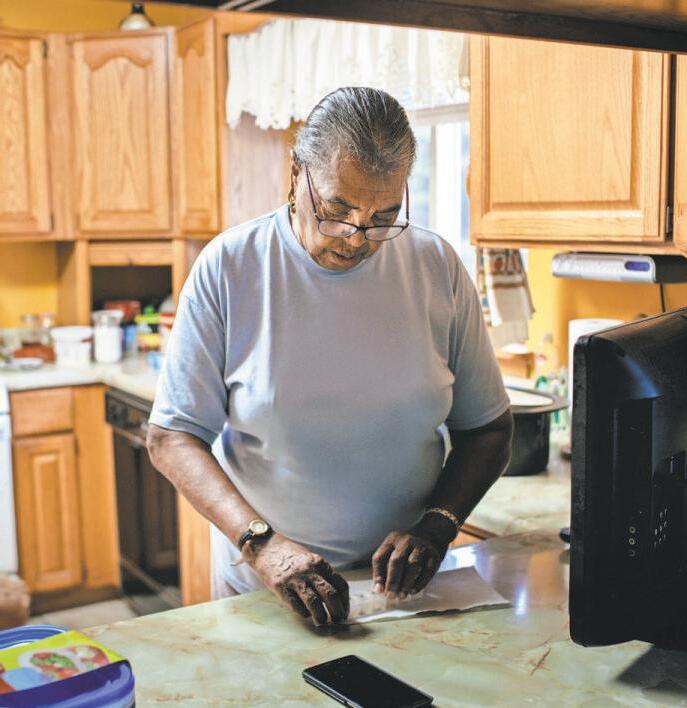
especially those aged 65 and over, the rising costs are becoming unbearable.
Black Americans are more likely to suffer from conditions like diabetes, chronic pain, and high blood pressure, which means that these skyrocketing prices have a disproportionately negative impact on them. Enhertu, a drug used to treat HER2-positive breast cancer, has seen its price rise eight times since 2019. This is especially alarming for Black women, who are more likely to die from HER2-positive tumors than white women. Meanwhile, the price of Revlimid, used to treat multiple myeloma, has jumped to over $89,000 per month. Black Americans are more likely to suffer from multiple myeloma and experience worse outcomes.
Price hikes force patients to make life-threatening decisions, officials said. The Biden administration has taken steps to address the issue through the Inflation Reduction Act, which aims to cap out-of-pocket drug costs for Medicare beneficiaries at $2,000 annually by 2025. President Biden also announced that Medicare will begin negotiating lower prices for some of the most expensive and widely used drugs. In his statement, Biden emphasized the stark contrast between his administration’s actions and the opposition from Republicans in Congress, who he said have consistently tried to repeal these reforms.
“For too long, millions of Americans have faced the impossible choice of paying for their prescription drugs or being able to afford other basic needs,” Biden said. “While Big Pharma made record profits, Americans footed the bill for the industry’s price hikes. Not anymore.”
Starting in October, seniors and people with disabilities enrolled in Medicare will pay less for 54 Part B prescription drugs, Biden announced. “That means more money will go back into the pockets of people with Medicare – including some of the 822,000 seniors and people with disabilities who use these drugs annually to treat conditions like cancer, osteoporosis, and pneumonia, and some seniors will save more than $3,800 per day,” he stated.

Only Xfnity can efortlessly handle a house full of devices. All at the same time. Which means that you and everyone else can seamlessly watch, work, stream, and play whatever you want on all your devices with ultra-low lag. Get ready for a network that can handle the entire house, no matter how full it is.
Ends 10/10/24. Restrictions apply. Not available in all areas. New Gigabit Internet and Xfnity
and automatic payments with stored bank account. Without
The discount will appear on your bill within 45 days of
the
service
By Laura Onyeneho
Houston public schools, like many across Texas and the United States, are grappling with a significant teacher shortage, leading to an increase in the hiring of uncertified teachers. HISD experienced a staffing drop of nearly 750 teachers compared to last year.
HISD Superintendent Mike Miles attributed it to the need to adjust staffing to match student enrollment at each campus, indicating a significant student decline. For the 2024-2025 school year, the district hired around 850 uncertified teachers. At the end of the previous school year, there were 2,770 teaching openings, and around 1/3 of them were filled by educators lacking the required credentials.
Dr. Heath Morrison, CEO of Teachers of Tomorrow and former superintendent of Montgomery Independent School District, navigated complex challenges while improving the district’s financial and academic standing. During his tenure, he reversed a budget deficit, implemented aggressive teacher pay raises, and enhanced professional development, leading to an “A” rating from the Texas Education Agency (TEA). This success earned him a Texas Superintendent of the Year nomination in 2020.
Now, as the leader of Teachers of Tomorrow, Morrison is focused on addressing the severe shortage of qualified teachers. He
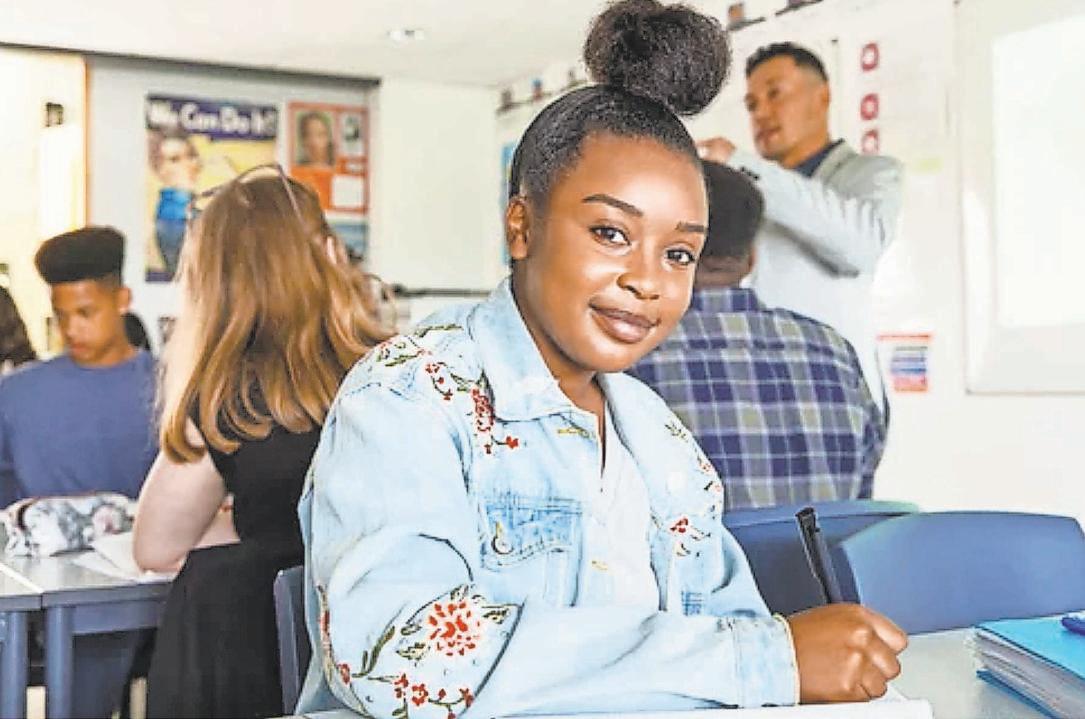
For the 2024-2025 school year, the district hired around 850 uncertified teachers. At the end of the previous school year, there were 2,770 teaching openings, and around 1/3 of them were filled by educators lacking the required credentials.
says that the shortage is particularly acute in Texas, where 29% of new teachers were hired with emergency certification last year, meaning they had no prior training. University programs produce fewer graduates, and projections indicate over 225,000 teacher
vacancies nationwide by 2025.
Morrison says that Texas has been hit particularly hard, with school districts increasingly relying on uncertified teachers to fill classroom gaps.
Morrison pointed out that many uncertified
By Aswad Walker
Though the University of Texas at Austin currently boasts the #1 ranked Division I college football team in the nation, a team many experts pick to win this season’s National Championship, the school is losing when it comes to cultural diversity.
At least, that’s the assessment of many UT alumni, current students, and faculty regarding the school’s responses to S.B. 17, which bans diversity, equity, and inclusion (DEI) programs at public colleges and universities throughout Texas.
In response, many are calling for Black parents to bypass sending their student-athletes to UT and other universities that have recently banned DEI.
“We have to ask a question as a community of color, why are we sending our kids to schools that don’t celebrate who we are now? We need to reevaluate where we send our talent and where we’re sending our athletes. You’re not sending them to a place that’s welcoming anymore,” said UT alumna Kimberley Yancy.
Moreover, Yancy says Blacks must demand that our taxpayer money is being given out equitably.
“UT gets more taxpayer money than any other public school in the state of Texas. Basically, we’re financing our own oppression. Think about that. We are sending money to the University of Texas as taxpayers, and they are telling our students, ‘We don’t care about you.’”
She asserts SB 17 must absolutely be repealed in this next 2025 state legislature.
“We need everyone to call their state representatives and tell them that SB 17 is detrimental to the health and emotional health of students at the University of Texas.”
Yancy, a LaMarque, TX city councilmember, added, “The heroic and game-changing work done by Black students at UT in the 80s and early 90s, it’s sad to say, but in a matter of one year, SB 17 has destroyed that work.”
In addition to the nearly 60 faculty and staff who were fired in the Spring due to the end of DEI-funded programs and positions, UT campus organizations were required to remove any mention of race in their names. Funding to support Black, Latino, immigrant, and other historically underserved and underrepresented groups is now gone, leaving organizations scrambling for resources to provide the programming and support they have offered for decades.
And current students feel it.
“It’s beyond Black and Brown students. It’s also students who have disabilities who are sad. There are students who represent different genders and sexualities who are sad,” graduate student Zion James told NBC News. “Overall, the campus morale is sad. We don’t know what to do. We don’t know where to go, or how to move forward.”
Though James was unsure how to proceed, thousands of UT students have been very decisive in choosing to protest SB 17 and UT’s decisions to interpret that legislation in the most draconian ways, with various forms of activism, including protest marches, podcasts addressing the issue and more.
“The university we were proud to be admitted to kind of turned their back on us and took away our support services, our staff that helped us feel more welcome at this university,” said Victoria Uriostegui, a student activist who provides support for immigrant students at UT.
teachers hold bachelor’s degrees and have clean backgrounds but lack formal education training or classroom experience. Some districts have even hired individuals without a degree, a trend that raises concerns about the quality of education students receive. The shortage has forced districts to make difficult choices, often placing uncertified teachers in classrooms where they are least prepared to succeed.
The consequences of this shortage are particularly pronounced for students of color. A Texas A&M study revealed that Black and Brown students, as well as those in rural areas, are more likely to be taught by uncertified teachers than their white, more affluent counterparts.
“Students who are already behind cannot afford to be taught by someone figuring out how to teach while they’re on the job,” Morrison said. “No district wants to hire uncertified teachers,” Morrison clarified, adding that he had spoken directly with HISD leaders. “But when there aren’t not enough certified teachers are available, districts are forced to make these difficult decisions.”

The University of Texas struggles with cultural diversity after SB 17 banned DEI programs, prompting student, faculty and alumni protests.
Credit: Screenshot.
More than 600 UT faculty members signed a letter expressing displeasure with university president Jay Hartzell, claiming UT’s removal of staff after the state passed SB 17 happened despite Hartzell earlier indicating that the university’s Division of Campus and Community Engagement (DCCE) complied with SB 17.
The situation is so dire the Texas NAACP is planning on suing UT regarding the organizations UT isn’t allowing campus meeting spaces and operating funds.
“We’re suing so that the school can lose their federal funding because their actions regarding SB 17 are a direct violation of federal law,” said Yancy, an NAACP Texas member.
By Laura Onyeneho
When it comes to issues like immigration during the presidential election cycle, political parties are placing a major focus on immigrant voters, particularly those who could sway outcomes in key battleground states.
One group that often flies under the radar in these discussions is Black immigrants. This rapidly growing demographic is reshaping the Black electorate with its diverse social, cultural, and political views.
According to the New American Economy, the Black immigrant population grew by 30% between 2010 and 2018, and the 2020 U.S. Census allowed Black Americans to list their national origins for the first time. As a result, individuals like Ghanaian Americans in Texas could mark “Ghana” to highlight their heritage. With this recognition comes visibility: 4.3 million Black immigrants now reside in the U.S., and 2.5 million of them are eligible to vote.
In Texas, Black immigrants have nearly doubled, from 172,000 in 2012 to 309,900 in 2022, making them a critical part of the electorate. To better understand the significance of this growing voting bloc, the Defender spoke with local Black immigrants who shared their personal journeys, their views on politics, and why voting is essential for them.
Gil Ingles is an IT infrastructure engineer and award-winning media personality who immigrated to the U.S. from Angola at 15. “I came from Angola, a country still at war, where opportunities were scarce. It wasn’t something we had planned. The school year had already started, and I had to go through the process of changing my status to a student.
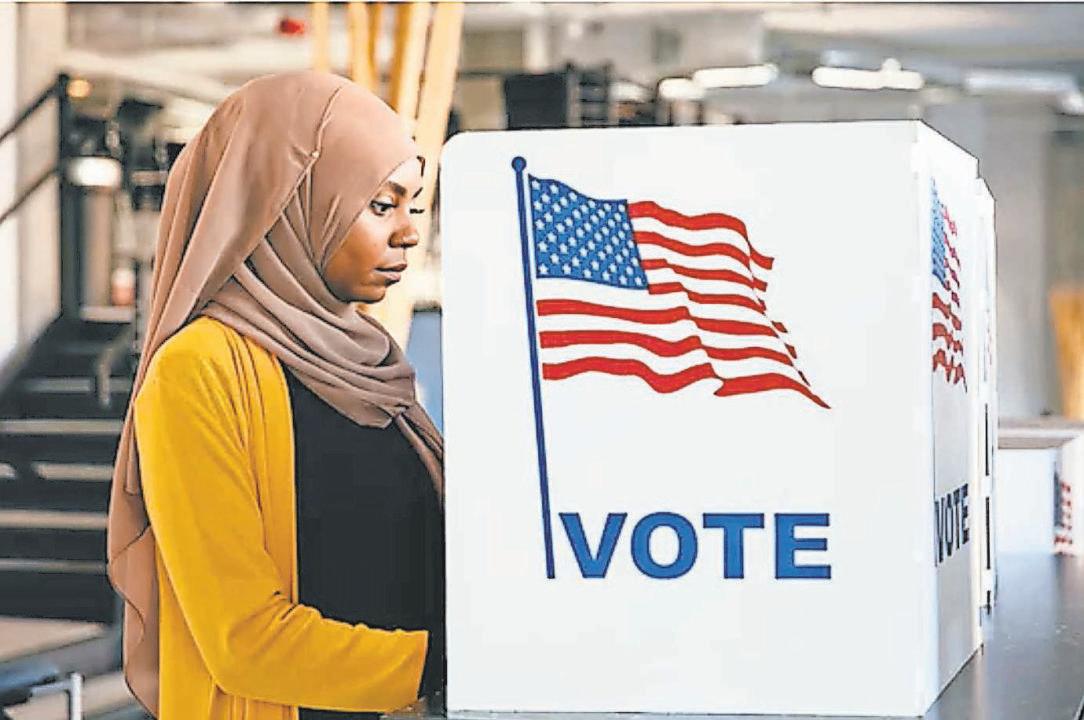
So, adapting to American culture and independence was a challenge.”
Ingles’ experience as an immigrant also shaped his political identity. “I came during the Reagan administration, and I started to understand politics during the Iran-Contra hearings,” he explained. “I noticed early on that there were two Americas—Black America and White America—each navigating politics differently. For Black America, churches, fraternities, and community centers played a huge role in election times.”
This awareness of the two contrasting Americas helped Ingles form his own views on the importance of voting and civic engagement. “Voting means freedom and the right
to choose. It’s really the soul of America,” he says. “It’s about listening to the candidate and deciding based on their platform and how it will impact my community.”
Over time, Ingles has become a voice for the African diaspora through his radio show, helping bridge the gap between African immigrants and their American-born counterparts. The platform fosters discussions around identity, culture, and politics, highlighting how varied Black immigrants’ views are. “Black immigrants are much more diverse than people think,” Ingles explained. “We come from Africa, the Caribbean, South America, Europe. Naturally, that diversity extends to our political and social perspectives.”
For Bernada Garcia Nuñez, her decision to leave her home country was driven by the pursuit of better opportunities. “It wasn’t an easy decision,” she shared. “I left everything behind in Honduras — my family, friends — but I had to do it for my future.”
Arriving in Houston, Nuñez found comfort in the city’s large and diverse immigrant population, which helped her transition to life in the U.S. “I was surprised by how many Black immigrants lived in Texas,” she said. “In some ways, it felt like home, but there were still many barriers to overcome.”
One of the most significant hurdles for Nuñez was navigating the complexities of U.S. politics. “Politics in Honduras was very different. Here, I had to learn how the system worked, how to register to vote, and what my rights were,” she said. Over time, she became more engaged, especially with community issues.
Nuñez identifies as a Democrat and is particularly passionate about immigration reform and access to healthcare. “I vote because I want to make sure immigrants like me have a voice,” she explained. “Policies either help or harm immigrant communities, and I want to ensure that people like me are protected.”
Nuñez spoke about Black immigrants’ unique challenges, particularly their sense of invisibility in national political discussions. She feels like local officials should find better comments other than Hispanics stealing jobs or that they’re criminals.
“We’re often overlooked because we don’t fit into the usual categories,” she said. “But we’re here, and we’re growing in numbers.”
The 2024 election presents an opportunity for Black immigrants to make their voices heard. However, the community’s diversity makes it difficult for political parties to craft one-size-fits-all messaging. “Some of us are more progressive, some conservative,” Ingles pointed out. “At the end of the day, we all want to be recognized.”
Nuñez leans progressive. She hopes Vice President Kamala Harris wins this year not just because she is a woman or person of color but also because she is someone who “is smart enough and doesn’t only think about the money.”
“My first vote was in March 1977. I’ve been living here for more than 30 years, and having a household where two incomes don’t feel like it’s enough is hard. I didn’t get an education because I was the oldest of eight children supporting my family,” she said. “With my vote, I hope that it makes some type of difference especially for immigrants who can’t vote.”
By ReShonda Tate
With the voter registration deadline on Oct. 7, local leaders and community advocates in the Houston area are ramping up efforts to ensure that every eligible voter is prepared to cast their ballot, and that they turn out to vote on Nov. 5.
The urgency is particularly high in Houston’s Black community, where past voter suppression tactics and systemic barriers have highlighted the importance of turnout and civic engagement.
Houston, one of the most populous and diverse cities in the United States, has long been a battleground for voter registration efforts. As of recent reports, Harris County has over 2.6 million registered voters, but hundreds of thousands more remain unregistered. This number is especially concerning given Texas’ growing population and the influx of younger, more diverse residents who are underrepresented at the polls.
Voter registration drives are in full force, led by organizations like the NAACP, the League of Women Voters, and local grassroots groups. Across the United States, members of Divine 9 organizations are uniting around a singular mission: increasing voter turnout in the US election this year. From sharing videos to posting voter registration links on their large Instagram accounts and developing voter turnout initiatives in secret group chats, members are using their Black Greek networks and social networks to bring more people to the polls.
“Through voter registration drives, candidate forums, and political awareness initiatives, D9 organizations help empower African Americans to make their voices heard in local elections,” said Cliff McBean, president of Phi Beta Sigma Fraternity, Inc. “By increasing voter turnout and participation, particularly within African American communities, D9 organizations contribute to the larger goal of ensuring that leadership at the local level is representative and responsive to the needs of all citizens, creating a more just and equitable society.”
While Divine 9 organizations do not officially endorse candidates, historically, they have made voter turnout and registration a pillar in their service initiatives. Already, outreach on social media is working. One post of the Harris event from Watch the Yard, a leading social media platform for Black college culture and Greek life, racked up more than 122,000 plays.
Black Greek organizations are not only
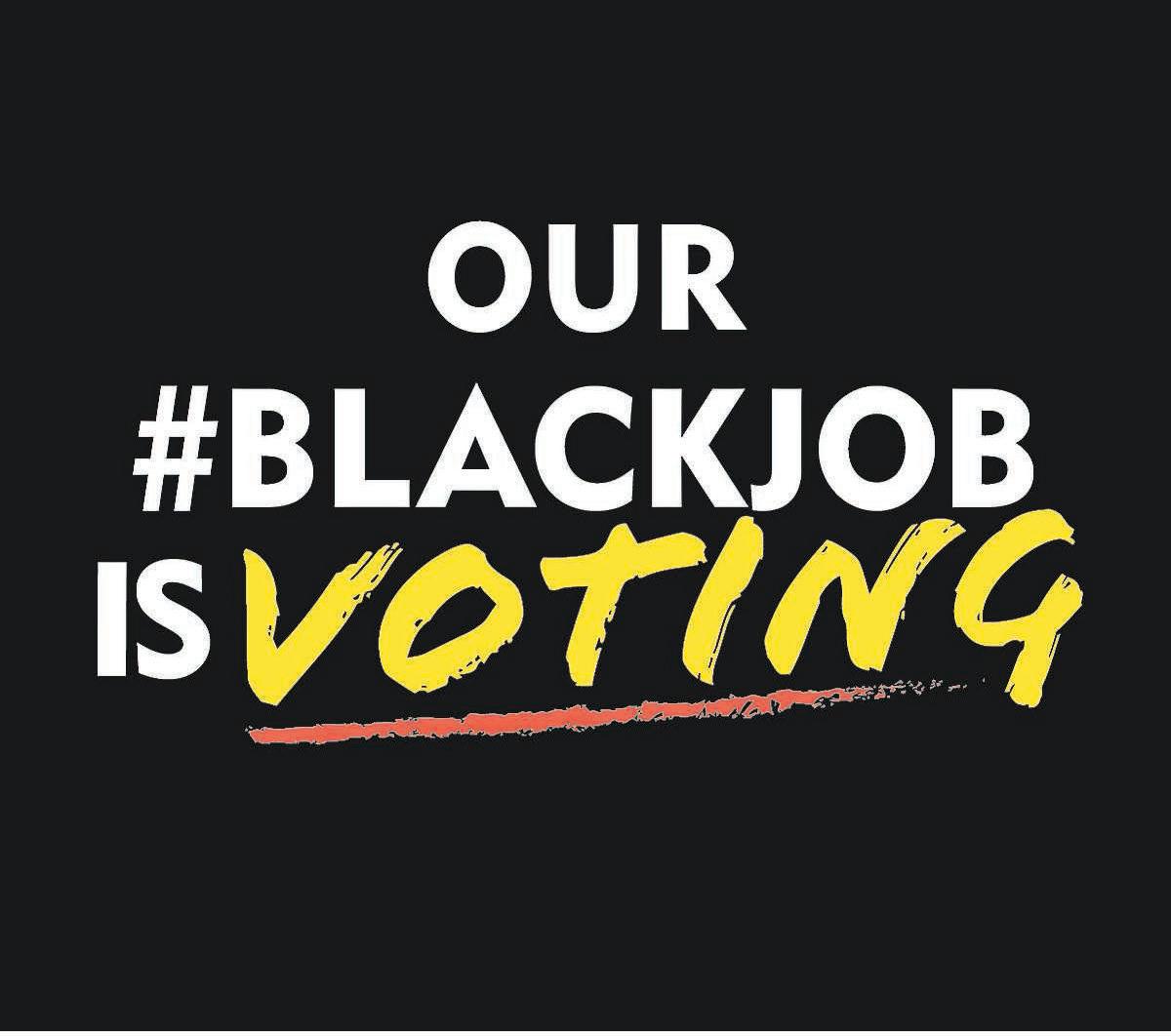
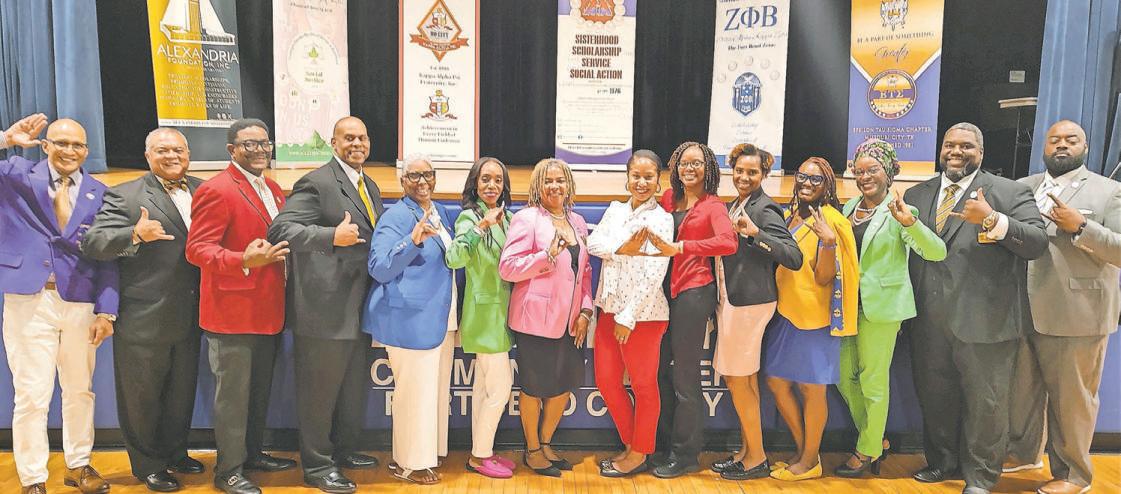
The Black community in Houston, which makes up roughly 22% of the city’s population, has a long history of political engagement dating back to the Civil Rights Movement. However, voter suppression tactics, including restrictive voter ID laws, gerrymandering, and reduced access to early voting, have historically targeted this group.
with nearly 67% of registered voters casting a ballot. This marked a 10% increase from the 2016 election. While Houston saw high levels of participation, there were still notable disparities in voter turnout among racial groups. For example, while the turnout among white voters exceeded 70%, turnout among Black and Latino voters was significantly lower, hovering around 50-55%.
The 2018 midterms also illustrated the importance of local and state elections. Despite an increased effort to mobilize voters, Texas ranked near the bottom of voter turnout compared to other states, and Harris County was no exception. Yet, those elections proved critical for local races, particularly judicial and school board elections that impact day-to-day life in communities of color. The upcoming 2024 election promises to be another pivotal moment, with state, local, and federal offices on the line.
WHAT’S
The 2024 election cycle will determine not only the next president but also numerous state and local officials, including members of Congress, judges, and school board representatives. These elections are crucial, as decisions made at the state and local levels will have direct effects on education funding, criminal justice reform, voting rights, and healthcare access—issues that disproportionately affect Black residents in Houston.
“Your local elections determine your city and county priorities, and state representatives make policies and implement budgets that impact schools, infrastructure, safety, health care and so much more,” said Katie Campbell Shumway, executive director for the League of Women Voters of Houston.

Low voter turnout is a perennial concern, as is a gap in voter registration. In Harris County, about 20 ZIP codes have less than 80% of their eligible population registered to vote.
“When a large percentage of people abstain from voting, elected officials may not represent the will of the people,” Campbell Shumway said.
Voter suppression efforts continue to be a concern. In 2021, Texas passed one of the most restrictive voting laws in the country, limiting mail-in ballots, tightening ID requirements, and imposing penalties for voter assistance. These new restrictions could further suppress turnout in the Black community unless there is a concerted effort to register and mobilize voters.
CHECK YOUR STATUS
Amid the state’s recent purging of voter rolls, residents are encouraged to check their voter registration information or register to vote if they have not already done so. Registered voters can go to the Harris County Tax Office’s to ensure all of their information is updated.
EARLY VOTING Mon., Oct. 21-Fri., Nov. 1. Election Day, Tues., November 5 688 vote centers will be open Election Day
organizing online publicly but privately as well. Unofficial secret GroupMes are being started with the purpose of increasing voter turnout throughout their communities. The privacy of the group allows members to share
information on key campaign platforms for both candidates, create strategic planning for voter registration in underserved communities, and share opinions on candidates without the pressure of maintaining official protocols.
“Ensuring high voter registration and turnout is vital not only for representation but also for tackling issues that disproportionately affect the Black community, such as economic inequality, education, healthcare, and criminal justice reform,” said political strategist Sharon Watkins Jones. Recent elections have shown the power of the Black vote. In 2020, Black voters in Houston played a crucial role in narrowing the gap in statewide races, and similar patterns
were observed in the 2018 midterm elections. However, the state’s low voter turnout rates, particularly among minority groups, demonstrate that there is still significant room for improvement.
In the 2020 presidential election, Texas saw its highest voter turnout in decades,
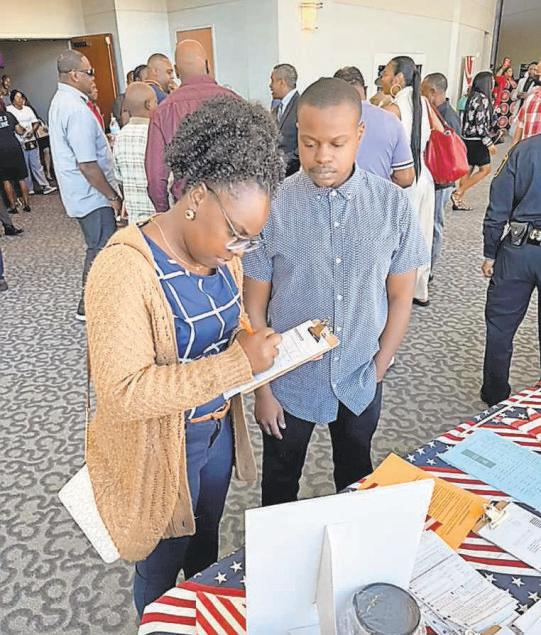
The redrawing of congressional districts in Texas has raised alarm bells, as some maps appear to dilute the voting power of Black and Latino communities by spreading these voters across multiple districts. This practice, known as “racial gerrymandering,” could limit the political influence of communities of color, making it even more important for those who are registered to show up and vote.
The fight for voter registration in Houston, especially within the Black community, is more important than ever. Community leaders are doubling down on outreach, education, and mobilization efforts to ensure that no voice goes unheard.
“Voter registration is up in all parts of the city. Voter Registrars are actively going to barber shops, churches, high schools and college campuses.We’re thrilled with voter registration efforts, but that’s only half the battle,” said voter registrar Pam Gaskin.
“Now, we have to get those people out.”
The League of Women Voters of Houston is a nonpartisan resource designed to empower voters by providing clear, accessible information about candidates and the elected offices that will appear on the ballot. The Guide also features responses from candidates focusing on issues relevant
By Aswad Walker
Recently, Black Voters Matter (BVM) announced a commitment of $300,000 to support Get-Out-the-Vote (GOTV) initiatives led by Divine Nine (D9) organizations in 11 critical states, including Texas.
This investment is part of a previously announced $15 million investment aimed at building power and increasing Black voter turnout in the 2024 election cycle.
The D9 members have a long history of service and civic engagement in Black communities and beyond.
A statement by BVM read, “By partnering with these organizations, we will expand our mobilization efforts by tapping into their networks to educate, organize, and turn out Black voters in key states.”
The 11 states targeted for this initiative are North Carolina, Michigan, Ohio, Pennsylvania, Florida, Georgia, Alabama, Texas, Maryland, Wisconsin and Arizona. Each state has significant Black populations and high-stakes elections that will shape the country’s direction.
“We are excited to partner with local Divine 9 chapters in the Houston and Dallas areas to increase our GOTV efforts leading up to the November election. These organizations truly are generational pillars that garner community trust and respect,” said Nomsa Hampton, media relations manager for Black Voters Matter.
“This investment will help fund mobilization efforts in Texas through direct person-to-person contact which is incredibly important in our communities given the wave of recent voter purges and misinformation targeting Black voters. Grassroots organizing is how we make real change in our communities and this partnership with the Divine
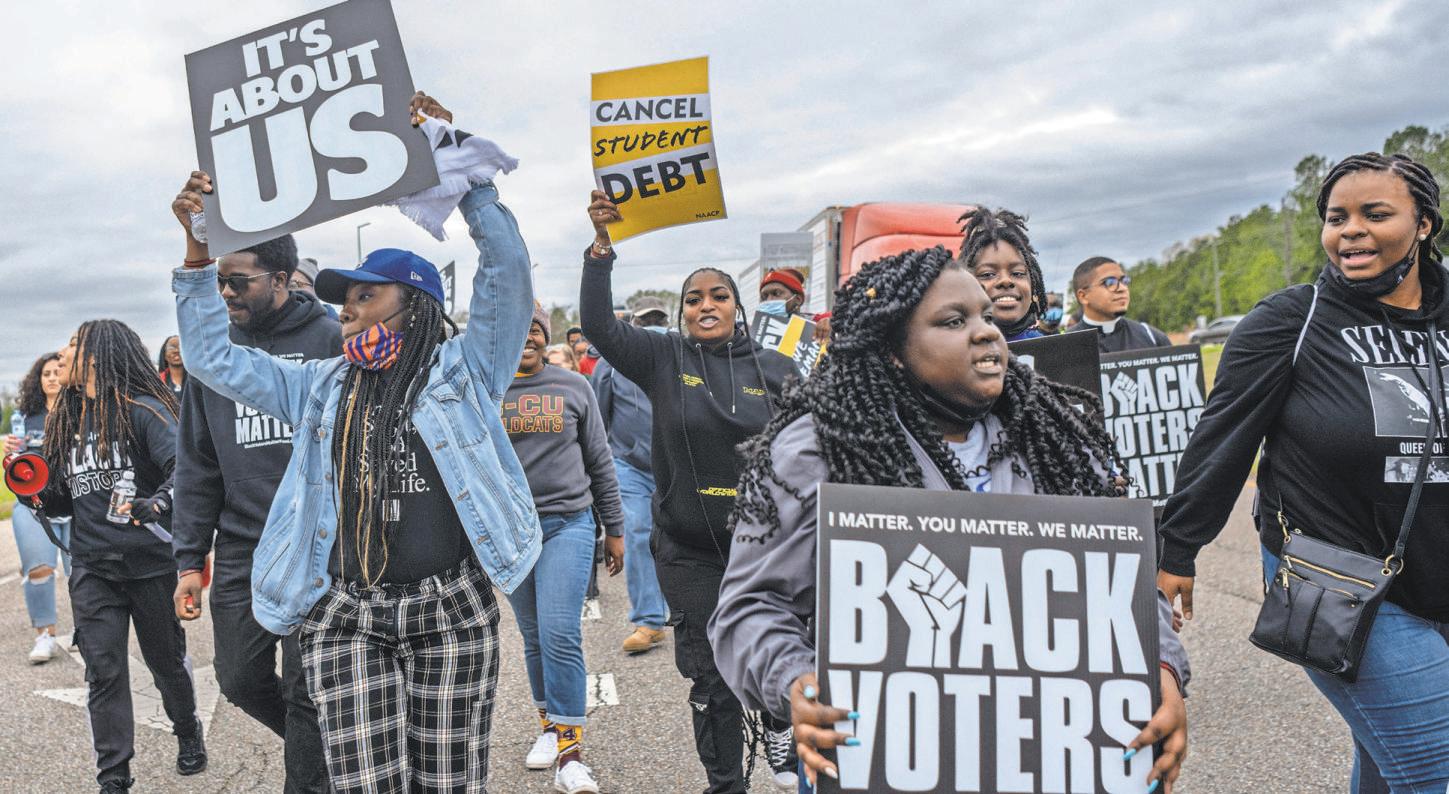
9 helps us to do just that,” added Hampton.
“Black voters have the power to be the deciding factor in elections at all levels,” said Cliff Albright, co-founder of Black Voters Matter. “By investing in the Divine 9 and the communities they serve, we are building the infrastructure and momentum needed to harness that power and deliver meaningful change. This is just the beginning of our efforts to create a country where Black voices are truly heard and represented.”

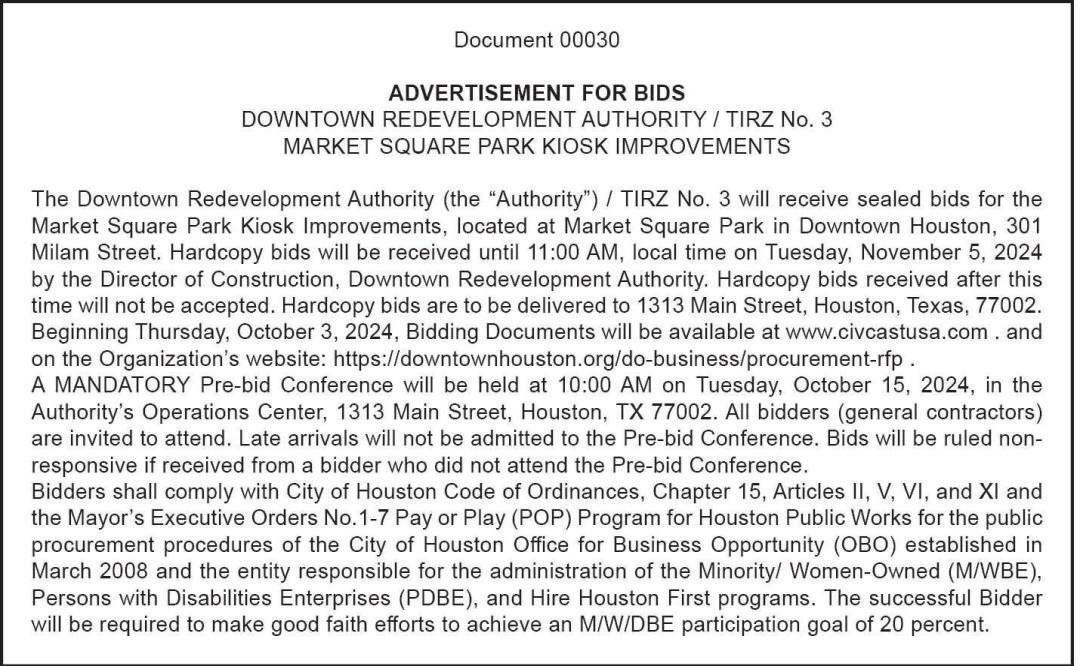
“These organizations have the trust, reach and dedication required to make a real difference in mobilizing Black voters,” said BVM co-founder LaTosha Brown. “This investment will help ensure our communities are heard loud and clear at the ballot box.”
To learn more about Black Voters Matter, visit www. blackvotersmatterfund.org and/or follow BVM on social media @blackvotersmtr.

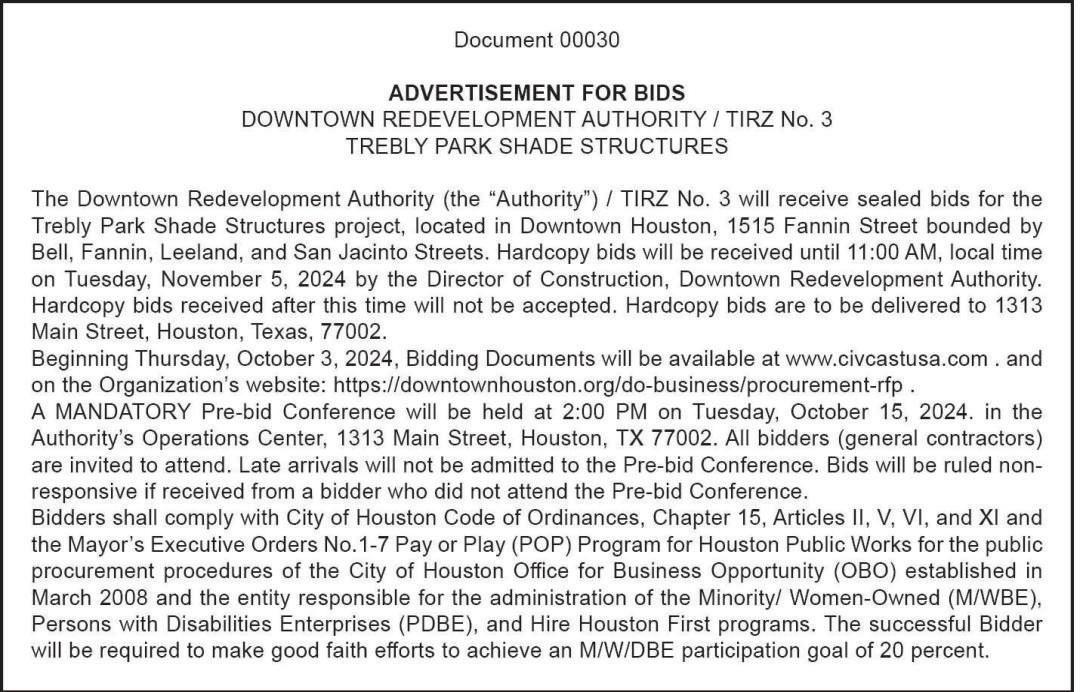
Government agencies, school districts, prime contractors, probate lawyers, and more... use our new self-serve system for placing classified ads

The late Rev. Floyd Nathaniel “F.N.” Williams Sr. is being remembered as a committed religious and civil rights leader who cared deeply about his community. Williams, who served as pastor of Antioch Missionary Baptist Church in Acres Homes for 66 years, died Sept. 27 at age 95.
He held numerous local and state positions over the years, including founder of Houston Ministers Against Crime, president of the Houston Baptist Pastors and Ministers Fellowship, moderator of the Independent Baptist General Association of Texas, first vice president of the Missionary Baptist General Convention of Texas and first vice president of the Baptist Ministers Association of Houston.
He was nationally known as well. He worked with Dr. Martin Luther King Jr. and the Southern Christian Leadership Conference and played a key role in King’s 1967 visit to Houston. He brought the late President George H.W. Bush to Acres Homes.
Williams was born into a family of ministers and was the son of the Rev. M.C. Williams and grandson of Rev. Mike Williams. He attended Bishop College and earned a Bachelor of Divinity Degree.
After serving in the U.S. Army during the Korean War, he began his pastoral career at Greater Union Baptist Church in Matthews, Texas and later served at Baptist churches in Eagle Lake and Beaumont. He was named pastor of Antioch in 1958 following the death of his father.
In addition to his ministerial work, he served as editor of the Globe Advocate Newspaper, director of the Houston Council on Human Relations, director of the Northwest Water District City of Houston, member of HISD Human Relations Committee. and member of the KYOK Advisory Board.
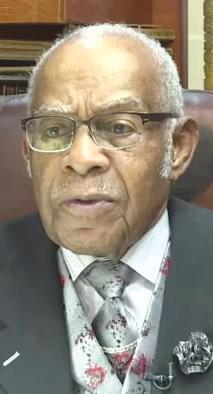
HOUSTONIANS REMEMBER
REV. F.N. WILLIAMS
“Another legend is gone! From Acres Homes, Houston, God used [Rev. Williams] to bless our state, the nation and the world.” – NAACP Houston Branch President James Dixon II
“My condolences on the loss of the one and only Rev. Dr. F.N. Williams. My prayers are with the family, friends and church community.” – State Rep. Ron Reynolds
“Rev. Williams’ passing leaves an unfillable void in my life and a great loss in the community he served so faithfully. Over the years, he introduced me to the Acres Homes community, showing me the value of service, leadership and faith.” – Mayor John Whitmire
THURSDAY, OCT. 10
Lying In-State
1-6:30 p.m.
Antioch Missionary
Baptist Church 5902 Beall St.
Ministers & Community Farewell Appreciation Service
6:30 p.m.
Antioch Missionary Baptist Church
FRIDAY, OCT. 11
Lying In-State 11 a.m.-6 p.m.
Antioch Missionary Baptist Church
Antioch Church Celebratory Service 6:30 p.m.
Antioch Missionary Baptist Church

In-Person Open House and Virtual Public M eetings I-45 North Houston Highway Improvement Project (NHHIP) US 59/I-69 at Spur 527 to I-45 at Beltway 8 Harris County, Texas
The Texas Department of Transportation (TxDOT) will construct improvements to Interstate (I)-45 from US 59/ I-69 to Beltway 8 North, including improvements on US 59/I-69 between I-45 and Spur 527 in Harris County, Texas This notice advises the public that the project team will be conducting an online virtual public meeting on the project with an in-person open house The virtual public meeting will include a live question and answer session
These meetings will provide updates on Segments 1 and 2 project activities, including the status and requirements under the Voluntary Resolution Agreement (VRA) between TxDOT and the Federal Highway Administration (FHWA) While the focus of these public meetings will be Segments 1 and 2 of the I-45 NHHIP, information on Segment 3, the downtown portion of the I-45 NHHIP project, will be available as well Segment 2 includes the portion of I-45 from I-10 to I-610 including the I-45/I-610 interchange, and Segment 1 includes the portion of I-45 from I-610 to Beltway 8.
A map depicting the full limits of the project, including all three segments, is available at www txdot gov/nhhip/project-segments/project-map html
TxDOT is providing an in-person open house option for individuals who would like to participate in-person. Inperson attendees will be able to view the same presentation as shown at the virtual public meeting, review hard copies of the project materials, ask questions, and submit written comments in any language
In-Person Meeting: Tuesday, Oct. 15, 2024
Moody Community Center 3725 Fulton St., Houston, TX 77009
5 - 7 p.m.
Virtual Meeting: Thursday, Oct. 17, 2024
5 p.m. Real-time Question & Answer Session
http://www.virtual nhhippublicmeetings com
Information to be shown at the public meetings will be available online starting on Tuesday, Oct. 15, 2024, by 5 p.m. at www txdot.gov/projects/hearings-meetings html and www txdot gov/nhhip/projectsegments/project-map html
Environmental studies and project updates are available online at the project webpage. Materials are also on file and available for review Monday through Friday by appointment between the hours of 8 a.m. to 5 p.m. at the TxDOT Houston District Office, 7600 Washington Avenue, Houston, Texas, 77007. Please call 713-802-5199 to schedule an appointment.
If you do not have internet access, you may call 713-866-7040 between the hours of 8 a.m. and 5 p.m., Monday through Friday, to ask questions Those without internet access are encouraged to attend in-person meetings. Feedback may also be provided by mail or email as explained below.
The virtual and in-person public meetings will be conducted in English with Spanish interpreters available If you need an interpreter or document translator because English or Spanish is not your primary language or have difficulty communicating effectively in English or Spanish, one will be provided to you free of charge. If you have a disability and need assistance, special arrangements can be made to accommodate most needs. If you need interpretation or translation services of if you are a person with a disability who requires an accommodation to attend and participate in the public meeting, please contact Gabriel Adame, Public Engagement Coordinator, at 713-802-5199 or Gabriel Adame@txdot gov, no later than 4 p m , Wednesday, Oct. 9, 2024. Please be aware that advance notice is required as some services and accommodations may require time for the project team to arrange.
Written comments from the public may be submitted in any language by mail to TxDOT I-45 NHHIP Ombudsman, TxDOT Houston District, P O Box 1386, Houston, Texas 77251-1386, or by email to nhhip.ombudsman@txdot.gov. All comments must be received or postmarked by Friday, Nov. 1, 2024
Please note that for the in-person meeting, oversized bags will be checked in at registration and will be returned upon exiting the meeting
French: Veuillez appeler le 713-802-5199 pour demander des aménagements spéciaux ou si vous avez besoin d'interprétation / de traduction.
SATURDAY, OCT. 12
Visitation
9-10 a.m.
God’s Grace Community Church 9944 West Montgomery Road
Homegoing Funeral Celebration
10 a.m.
God’s Grace Community Church
Arabic:
5199-802-713
Somali: Fadlan wac 713- 802-5199 si aad u codsato qodobo gaar ah ama haddii aad u baahan tahay tarjumaad / turjumaan.
Swahili: Tafadhali piga simu kwa 713-802-5199 ili kuomba malazi maalum au ikiwa unahitaji ukalimani au utafsiri.
Kinyarwanda: Mwihanganye ku 713-802-5199 kugirango mwishyure ibisabishijwe byihutirwa cyangwa niba mufite ubutabera bwo guhumurizwa/guhindurwa ku rurimi.
Mandarin (traditional Chinese):�如出席和参与会议需要特殊照顧或需要口譯/筆譯,�請撥打 713- 802-5199
Mandarin (simplified Chinese): 如出席和参与会议需要特殊照顾或需要口译/翻译 请拨打 713-802-5199
Vietnamese: Xin hãy gọi 713-802-5199 nếu bạn cần sự hỗ trợ đặc biệt hoặc người phiên dịch.
Creole: Tanpri rele 713-802-5199 pou mande aranjman espesyal oubyen si ou bezwen entèprèt oubyen tradiktè. Sign
By Laura Onyeneho
A recent poll conducted by the Episcopal Health Foundation paints a grim picture of healthcare affordability in Texas. According to the survey, nearly half of Texans are struggling to afford medical care, and a third have delayed or skipped care altogether due to cost concerns.
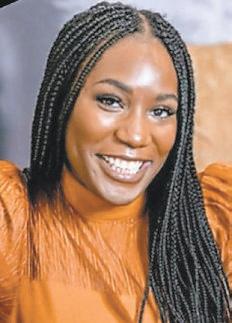
While the survey highlights a significant challenge, organizations like Legacy Community Health offer innovative solutions to alleviate the burden. As one of the state’s largest Federally Qualified Health Centers (FQHCs), Legacy Community Health primarily serves underserved populations, offering affordable healthcare through a comprehensive slidingfee-scale model, expanded telehealth services, and community outreach programs.
The Defender spoke with Chinelo Nweke, senior regional director of operations at Legacy Community Health, to learn more about the healthcare affordability crisis and what local organizations like Legacy are doing to address it.
Legacy Community Health has always focused on bringing healthcare to
communities that are often neglected, a mission that has become even more critical in the face of Texas’ healthcare crisis.
“We’re completely committed to providing access to all of our patients, especially underserved communities,” Nweke explained. “Much of our history started with addressing the needs of those communities that larger medical institutions often overlook. We place our clinics in areas with a demand and a need, such as the Fifth and the Third Ward.”
Legacy Community Health is tackling this by offering financial assistance programs for uninsured or underinsured individuals.
Nweke explained that the organization’s eligibility department helps patients explore different programs, from Medicaid to the Healthy Texas Women program, and provides sliding-scale fees for others who don’t qualify for state or federal assistance.
One of the most concerning revelations from the Episcopal Health Foundation poll is that cost barriers prevent many Texans from seeking preventive care. Preventive care is essential for diagnosing and managing chronic conditions before they become severe. The long-term impact can be disastrous when people skip routine checkups due to financial strain.
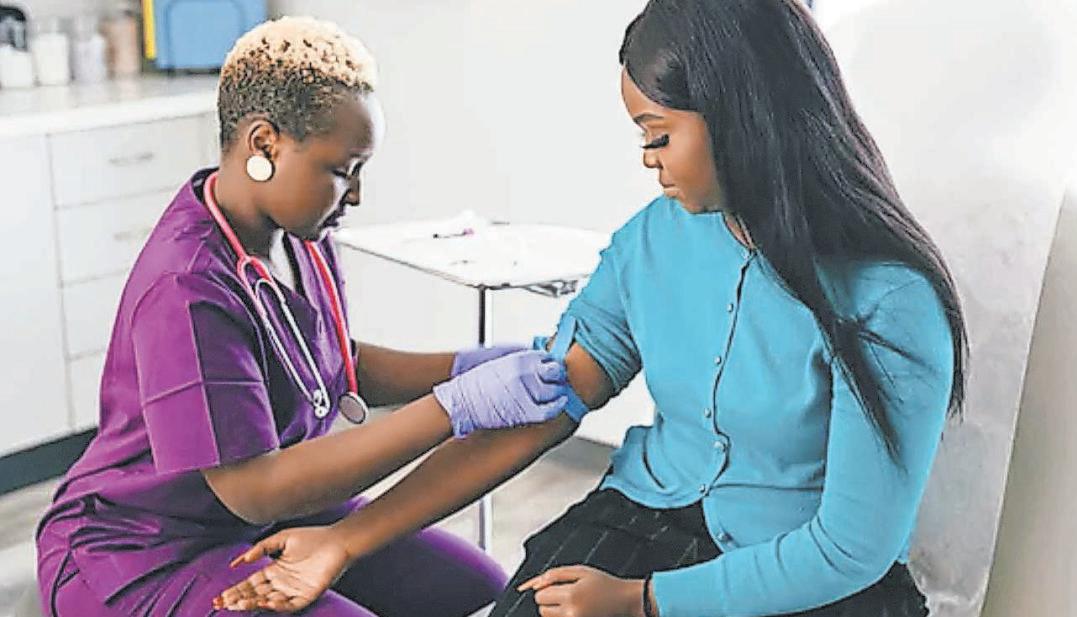
Texans are struggling to afford medical care, and a third have delayed or skipped care altogether due to cost concerns.
“This is a major issue, especially in the African American community,” said Nweke.
“There’s a hesitancy to go to the doctor, often due to past experiences or cultural anxieties. But preventive care is crucial. We must educate our patients on the importance of being proactive about their health.”
Their approach involves connecting patients with social workers and community partners to provide education on managing
common health disparities, such as high blood pressure, heart disease, and diabetes. Nweke highlighted their work with clinical pharmacy specialists who provide virtual consultations, helping patients manage their medications and understand key health metrics like blood pressure readings. This helps improve health outcomes and reduces long-term medical costs by preventing more serious conditions.

















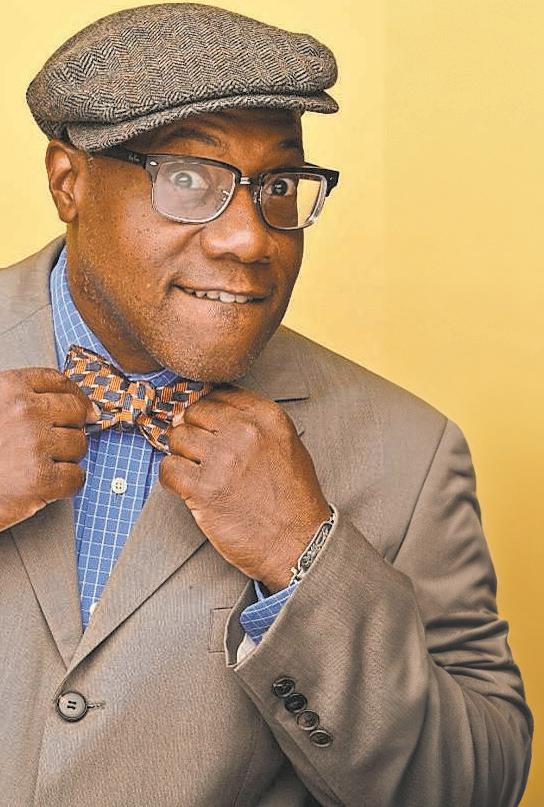
By Laura Onyeneho
Houston’s own Bryant Reginald Moss (best known as Preacher Moss) has made a name for himself in the comedy world with his thoughtful and socially conscious humor.
Nicknamed “Preacher” as a child for his entertaining imitations of church pastors, Moss has always had a talent for engaging audiences. Raised in a Maryland suburb and a predominantly African American community, his parents, both educators, instilled in him a love for learning and a deep sense of social responsibility.
“My mother and father always emphasized the importance of understanding our history and using our talents to uplift our community,” Moss says. This foundation would later become a cornerstone of his comedic and activist pursuits.
Moss’ journey into comedy was marked by a desire to address serious social issues through humor. He began performing stand-up in the late 1980s when comedy clubs were booming across the United States. His early material often touched on race relations, cultural identity, and social justice—topics close to his heart.
“Comedy was a way for me to talk about the things that mattered to me in a way that people could relate to and understand,” Moss explains. His unique blend of humor and social commentary quickly garnered attention, and he found himself working with legendary comedians such as George Lopez, Dave Chappelle, and Damon Wayans.
A significant turning point in Moss’ life came when he embraced Islam in the early 1990s. This decision, he says, was deeply personal and transformative. “Islam provided me with a sense of peace and purpose that I had been searching for.” He grew up around the Nation of Islam and was inspired by Muhammed Ali and Malcolm X, both Black icons who transitioned into Islam. His faith profoundly influenced his comedy, bringing a new layer of depth and introspection
to his work. He began incorporating themes of spirituality, tolerance, and understanding into his routines, challenging stereotypes and promoting interfaith dialogue.
In 2003, Moss co-founded the “Allah Made Me Funny” comedy tour, a groundbreaking project highlighting Muslim comedians and addressing misconceptions about Islam. The tour was a resounding success, traveling across the United States and internationally and receiving acclaim for its bold and insightful content.
“The goal was to create a platform where Muslim comedians could share their experiences and perspectives,” Moss says. “We wanted to show that humor is a universal language that can bridge divides and unite people.”
Beyond comedy, Moss is a dedicated activist and advocate for social justice. He has been involved in numerous initiatives to promote civil rights, interfaith understanding, and community empowerment.
One of Moss’ most impactful projects is his work with educational programs in underprivileged communities.
















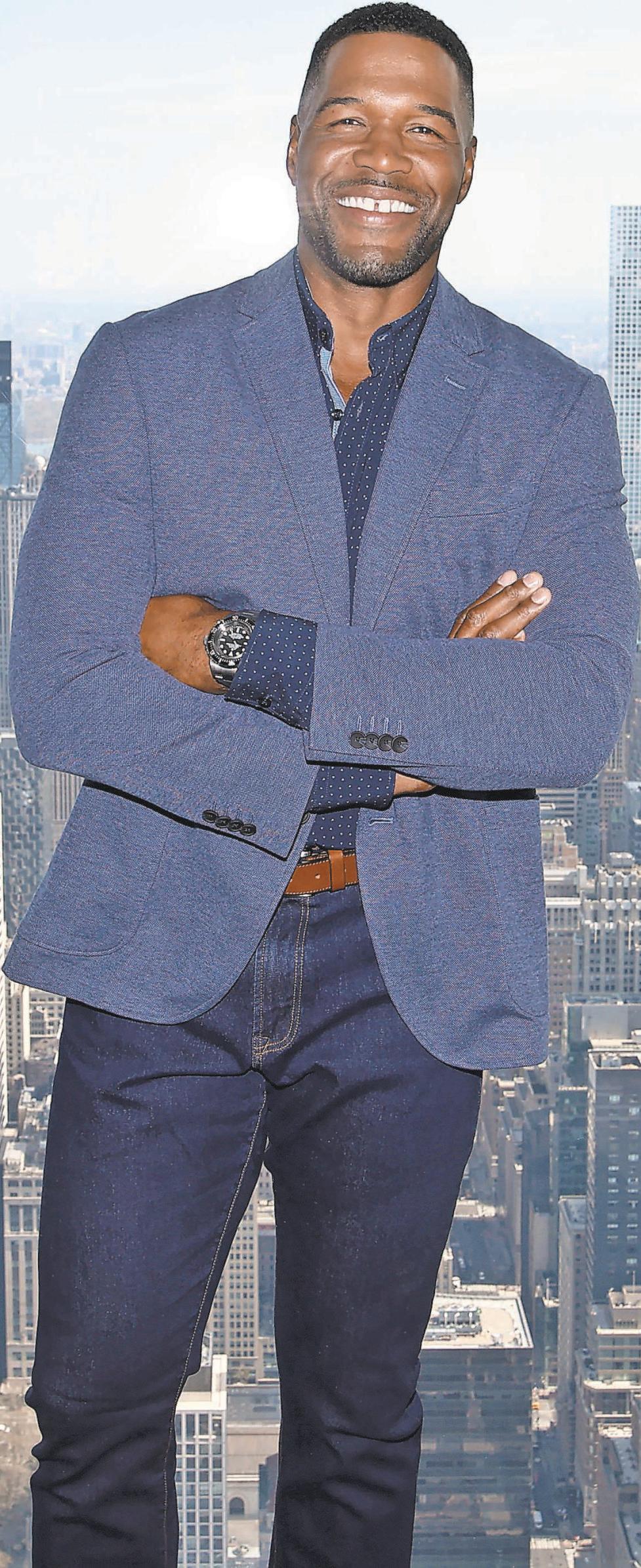
By Terrance Harris
It’s all somewhat funny to Walter Highsmith how Michael Strahan first came into his recruiting orbit at Texas Southern
He received a phone call from his good friend and former New York Giants teammate, Art Strahan, who told him about his nephew who had moved back to Houston from Germany and could play. That and measurements of the kid who had played only one season of football at HISD’s Westbury High School were all Highsmith needed to hear to start envisioning the young Strahan as a future tight end for the Tigers.
“He had the size at 6-foot-4 and 215 pounds so he could always develop,” Highsmith recalled recently. “But I liked him because his uncle called me and said, `Coach, I have a hell of a football player over here you ought to see. He’s my nephew.’
“I said, `Don’t worry, I will take him.’”
Highsmith had no idea what he was taking on, but he soon found out. The only thing left was for defensive coordinator C.L. Whittington to convince the offensive staff that Strahan was better suited for his side of the ball at defensive end.
From there it didn’t take long before Highsmith and his staff knew what they had on their hands, and that was one of the hardest working, most motivated and prolific defensive end prospects in the game.
Strahan, who starred for the Tigers from 19891992, ascended to be an elite sack specialist who established school records, earned All-American
recognition, and reigned as the SWAC’s most elite defensive player his junior and senior years.
Of course, that was only the beginning.
Strahan and his famous gap-tooth smile then took his act to the NFL and the New York Giants where he became a larger-than-life figure who impressed with his personality and dominance as a pass rush specialist. He has continued to impress as the co-anchor and face of ABC’s Good Morning America while moonlighting on the weekends as an analyst on Fox NFL Sunday, easily qualifying him as the most visible and recognizable Tiger ever.
Already a Pro Football Hall of Famer after 15 mostly decorated NFL seasons, Strahan will again be a bright star for his alma mater as he heads into the Texas Southern Sports Hall of Fame on Friday along with 23 other former athletes, coaches, administrators and supporters of the athletic department. The sold-out event will be held at the Ballroom at Bayour Place at 6 p.m.
It’s been a long-awaited honor.
“It’s huge for us and Texas Southern University and as an athletic program to have an opportunity to have a nationally known legendary person go in like Michael Strahan,” said TSU athletic director Dr. Kevin Granger, who is also being inducted in recognition of his spectacular basketball career at TSU in the early 1990s.
“When you look at his career and what he was able to accomplish not just on the football field either. He is still an iconic figure with the work he is doing in television broadcasting.
“When you add all of that together it’s just a great day for Texas Southern University and our athletic department to have an individual like Michael Strahan going into our Hall of Fame.”
During his TSU career, Strahan put together a career that still remains a standard that is in tack to this day. He recorded 19 sacks and had 32 tackles for loss totaling -142 yards.
Strahan wrapped up his four-year collegiate career with a TSU record 41.5 total sacks.
It only made sense that one of the most decorated and most highly visible former Tigers would headline the school’s first Hall of Fame class since 1996.
Defensive End 1989-1992
TSU accomplishments: Recorded a school-record 19 quarterback sacks as a senior and a TSU-record 41.5 career sacks.
Post-TSU career: Drafted in the second round (40th overall) in 1993 NFL Draft by New York Giants. Spent all 15 NFL seasons with the Giants. 7 x Pro Bowl, 4 x First-Team All Pro, NFL Defensive Player of the Year, Super Bowl Champion, 2 x NFL sacks leader.
Post playing career success: New York Giants Ring of Honor, NFL’s All-Decade Team, New York Giants Ring of Honor.
Pro Football Hall of Fame (2014), Black College Football Hall of Fame (2014), TSU Sports Hall of Fame (2024).
“I’m really proud of the fact I can look at him every day on Good Morning America and then Sunday’s on Fox,” said Tony Wyllie, who worked as a student in the TSU sports information department during Strahan’s time and was part of the Hall of Fame selection committee for this year’s class. “The accomplishments he has had on field and off, is just something we are all proud.
“He is well-deserving of all of the Hall of Fames that he is in because he is a Hall of Famer on and off the field.”
Along the way, Strahan has kept TSU and the football program close. He is often heard bragging about his alma mater on Good Morning America, and during his Pro Football Hall of Fame induction, TSU’s renowned band, the Ocean of Soul, marched in the parade in Canton, Ohio.
He has also remained a friend and supporter of the football program, purchasing the Tigers’ state-of-the-art helmets and fitting the players and coaching staff in his tailor-made Michael Strahan Suits, which have a signature TSU lining.
“Alums have to be engaged, have to be involved so that you can continue to push the narrative forward,” Granger said. “So anytime you can say you have an alum with the distinction of a Michael Strahan involved, it just pays dividends for your department.”

By Jimmie Aggison
While many high school teams have transitioned to fast-paced spread offenses, Sterling High School is staying true to an old-school approach, relying on a physical, run-heavy ground-andpound style. However, the Raiders have their own name for their powerful offensive approach–the “Ground Raid.”
Leading the charge is 5-foot-10, 225pound senior running back Jaylin Williams, a versatile and powerful athlete who’s turning heads this season.
“When teams throw it all over the place, they call it the air raid offense. However, at Sterling, we run the ‘Ground Raid’ because we’re the Raiders,” said head football coach Gary Jessie. “People want to play seven on seven. People don’t want to get hit in the mouth. Forcing a team to take on blockers and then tackle a 225-pound guy who has good speed
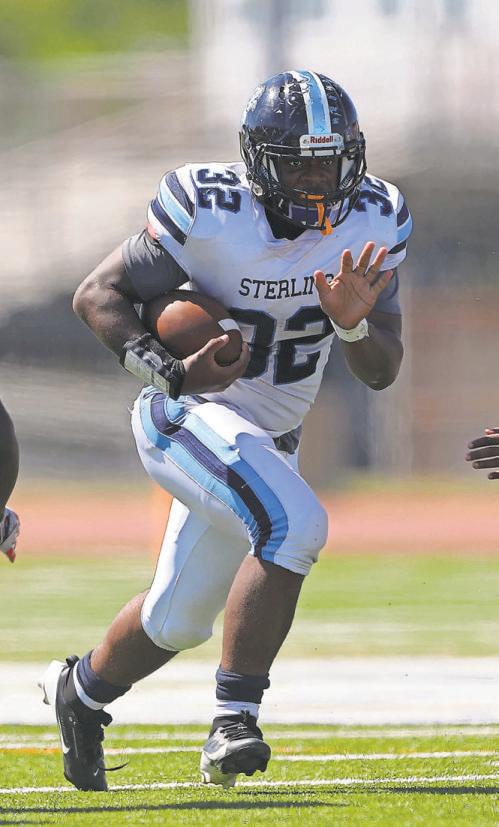
Sterling’s Jaylin Williams takes on Westbury defenders on his way to rushing for over 100 yards.
Credit Jimmie Aggison/Defender.
Class: 2025
IG: @JaylinW32
Twitter: @JaylinW32
Position: Running back

Height & weight: 5-feet-10, 225 pounds
Favorite artist: Lil Baby
Status: Uncommitted
Favorite subject: History
Shout-outs: All my coaches, Coach Jessie, Norris, Donald, Lazard, Carr, Davis, Thomas, and Atkins.
and is strong, is tough, and a lot of people don’t want to do that over and over and over again.”
Williams, a four-year varsity letterman, has embraced the art of the run game, drawing inspiration from NFL greats. His study of former Alabama star and Washington Commanders running back Brian Robinson has shaped his bruising style, while his admiration for Baltimore Ravens’ Derrick Henry’s ability to punish defenses and San Francisco’s Christian McCaffrey’s elusive power running have made him a well-rounded threat on the field.
run the ball but block for my teammates as well, as we score points,” said Williams.
Sterling, competing in the 5A-1 Region III Dis trict 10, is off to a fast start this season. Williams’ powerful running style been key in the Raid ers’ success, as they look to improve on last year’s 6-2 record in District 9, which earned them a playoff berth. Unfortunately, their postseason run ended early with a 56-6 loss to Magnolia in the first round.

This season, the Raiders, led by Williams, are deter mined to go even further.
“Although we lost in the playoffs after placing third in the district, we went back and worked harder. Our goal for this season is to advance past the first round,” said Williams.
“They’re all powerful runners. They’re strong, fast and elusive,” said Williams.
Despite being a dominant force on offense now, Williams spent his first three seasons primarily on the defensive side, playing as a defensive lineman and linebacker. His impact on defense earned him Co-Newcomer of the Year honors as a freshman and First Team All-District recognition as both a fullback and defensive tackle last season. This year, he’s fully transitioned to running back, and it’s paying off for the Raiders.

With aspirations of becoming a coach one day, Williams plans to major in Physical Education in college, though he has yet to com mit to a school. His dedication on and off the field, combined with the inspiration he draws from Coach Jessie, has driven him to excel.
“Coach Jessie is a good person and a good role model. He always says he’s not just coaching but raising young men,” said Williams.
“I enjoy the offensive side of the ball better because it allows me to not only

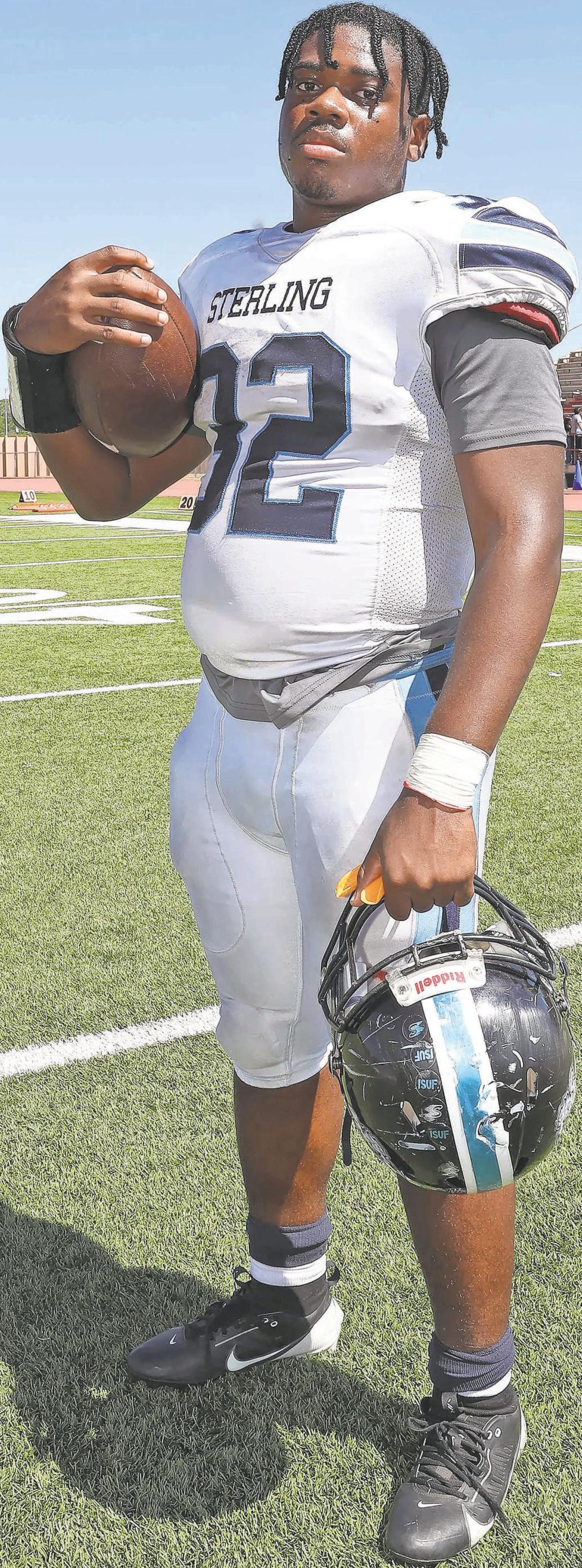
As Sterling continues its push for play off glory, one thing is certain: Jaylin Wil liams and his relentless “Ground Raid” running will remain the heart and soul of the Raiders’ offense.

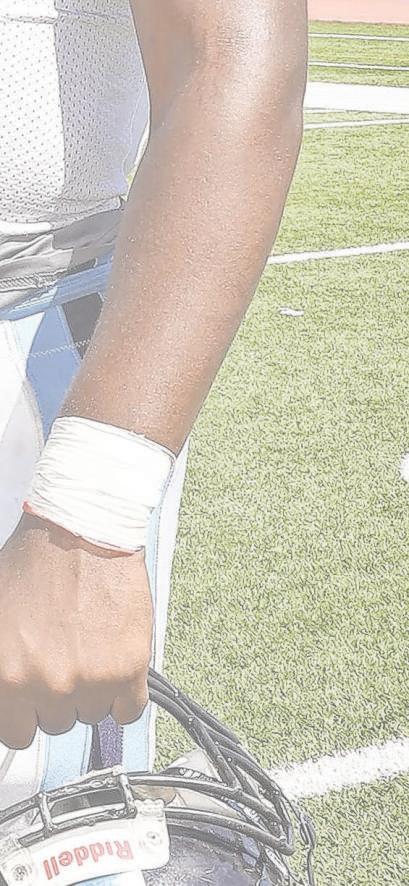

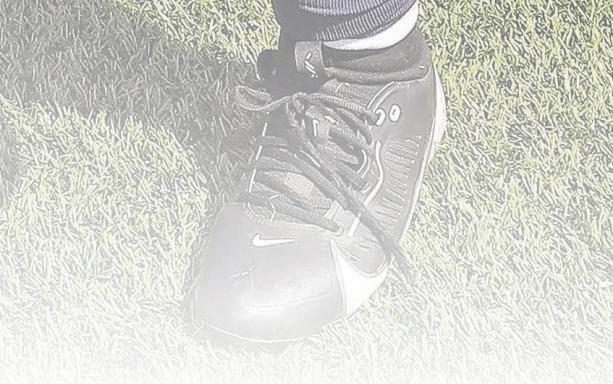
By Aswad Walker
As hard as some try to argue otherwise, researchers and scientists have proven without a shadow of a doubt that all human life began on the continent of Africa. This means Black women are literally and figuratively the mothers of all humanity.
Yet, Black women are still the most disrespected and under-appreciated demographic in this country. And that can be seen in every facet of life, including the music industry.
To rectify this madness in some small way, the Defender asked its readers to share their thoughts on the most unsung Black women in music—sisters whose talent and contributions have reverberated through the decades and whose greatness has stood the test of time, yet, they still haven’t received their just due.
Here is what Defender staff and our Defender faithful, said:
ROSETTA THARPE
This name was submitted by the Defender staff (me). Here’s how NPR described Tharpe: “Rock ‘n’ roll was bred between the church and the nightclubs in the soul of a queer Black woman in the 1940s named Sister Rosetta Tharpe. She was there before Elvis, Little Richard and Johnny Cash swiveled their hips and strummed their guitars.” Countless music legends point to Tharpe as the greatest innovator in music history.
RACHELL FERRELL
Apparently, Defender readers love them some Rachelle Ferrell. No artist received more mentions and votes than Ferrell. In fact, it wasn’t even close. Two of those who listed Ferrell are professionals in the music industry: singer/songwriter Tori Alamaze and musician Osakwe Rikondja. To explain why Ferrell should be on this list, one reader said, “Just listen. Enough said.”
JEWEL BROWN
The Houston-born Brown was an American jazz and blues singer of incredible renown. She performed alongside artists such as Dizzy Gillespie and Louis Armstrong and performed at places like Harlem’s “The Apollo Theater” and Houston’s Eldorado Ballroom, and all places in between. Brown, who died in June of this year, was inducted into the Blues Smithsonian Hall of Fame in 2007.
ROBERTA FLACK
(AKA RUBINA FLAKE)
A classically trained singer, songwriter, music educator and producer, Flack has been a force in all these areas, with a repertoire of over 600 songs. (Maisha Hyman)
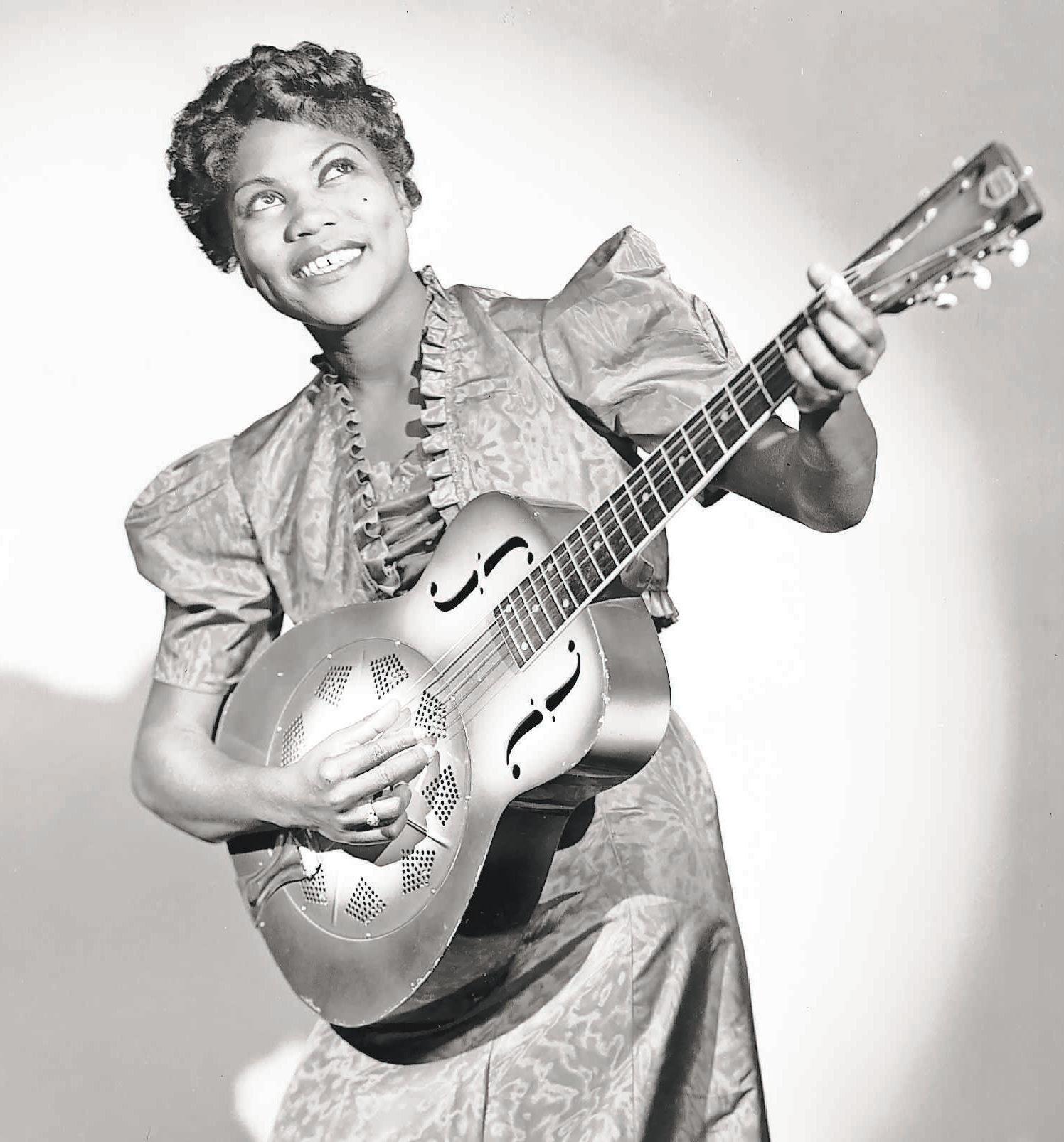
It’s past time that the unsung Black women in the music industry like Rosetta Tharpe pictured here get the recognition they deserve for their countless and timeless contributions. Credit: Getty Images.
HAZEL SCOTT
Arguably one of the greatest pianists to ever live, Scott was a Trinidadian jazz and classical pianist and singer. She was an outspoken critic of racial discrimination and segregation, which is probably why she’s so unheralded. To that point, Scott was not only the first African-American woman to host her own television show, but she also bravely stood up to the House Un-American Activities Committee and the Hollywood studio machine that was “blacklisting” people left and right, ruining people’s careers. Scott used
her influence to improve the representation of Blacks in film. (Zuberi Robert Woods)
BARBARA ANN
“BOBBI” HUMPHREY
Born in Marlin, Texas and raised in Dallas, Humphrey is a jazz flautist and singer. She has recorded 12 albums over the course of her career, mostly playing Jazz Fusion, Funk, and Soul-Jazz. In 1971, she was the first female instrumentalist signed by Blue Note, and in 1994, she founded the Jazz label Paradise Sounds..
MARTHA WASH
Wash made the 90’s house music scene what it was. She also pioneered larger women getting credit for vocals that were lip-synced by “models” and put women front and center (in videos and album covers) without regard to their size. (Michelle Meade)
NONA HENDRYX
Hendryx was truly the secret sauce & rock star quality of Labelle & the Bluebells. Her song “Transformation” is proof of this and still goes hard current-day. (Kimberly Easley)